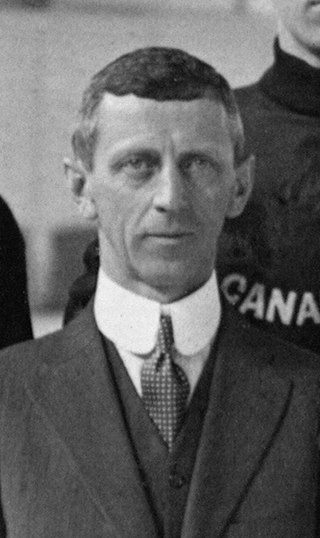
William Abraham Hewitt was a Canadian sports executive and journalist, also widely known as Billy Hewitt. He was secretary of the Ontario Hockey Association (OHA) from 1903 to 1966, and sports editor of the Toronto Daily Star from 1900 to 1931. He promoted the establishment of the Canadian Amateur Hockey Association (CAHA), then served as its secretary-treasurer from 1915 to 1919, registrar from 1921 to 1925, registrar-treasurer from 1925 to 1961, and a trustee of the Allan Cup and Memorial Cup. Hewitt standardized player registrations in Canada, was a committee member to discuss professional-amateur agreements with the National Hockey League, and negotiated working agreements with amateur hockey governing bodies in the United States. He oversaw referees within the OHA, and negotiated common rules of play for amateur and professional leagues as chairman of the CAHA rules committee. After retiring from journalism, he was the managing-director of Maple Leaf Gardens from 1931 to 1948, and chairman of the committee to select the inaugural members of the Hockey Hall of Fame in 1945.

Claude Copeland Robinson was a Canadian ice hockey and sports executive. After winning an intermediate-level championship as captain of the Winnipeg Victorias in 1905, he served as secretary-treasurer and as vice-president of the Victorias. He coached the Victorias to a Manitoba Hockey League championship in 1909, and felt that his team could have competed for the newly established Allan Cup, despite that challenges from senior ice hockey teams were accepted only from Eastern Canada at the time. The Victorias won the Allan Cup by default in 1911, when the Toronto St. Michael's Majors refused to play, then successfully defended four challenges for the trophy.

George Samuel Dudley was a Canadian ice hockey administrator. He joined the Ontario Hockey Association (OHA) executive in 1928, served as its president from 1934 to 1936, and as its treasurer from 1936 to 1960. He was elected to Canadian Amateur Hockey Association (CAHA) executive in 1936, served as its president from 1940 to 1942, as its secretary from 1945 to 1947, and as its secretary-manager from 1947 to 1960. He was secretary of the International Ice Hockey Association from 1945 to 1947, and was later vice-president of the International Ice Hockey Federation (IIHF) from 1957 to 1960. He was expected to become the next president of the IIHF before his death. He graduated from Osgoode Hall Law School in 1917 then practiced law for 43 years as the town solicitor for Midland, Ontario.
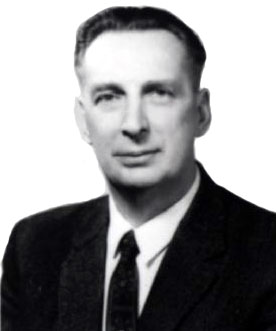
Hanson Taylor Dowell was a Canadian ice hockey administrator and politician. He served as president of the Canadian Amateur Hockey Association from 1945 to 1947, and was the first person from the Maritimes to serve on the national executive. He sought to have the Canadian definition of amateur recognized at the World Championships and the Olympic Games for the benefit of Canada's national team, and negotiated the merger of the International Ice Hockey Association into the Ligue Internationale de Hockey sur Glace. He served as president of the Maritime Amateur Hockey Association from 1936 to 1940, and later as treasurer of the Maritimes and the Nova Scotia Hockey Associations for a combined 30 years.
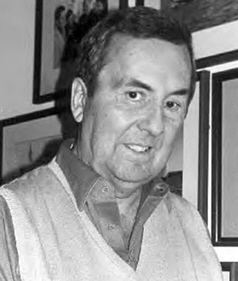
Gordon Ralph Renwick was a Canadian ice hockey administrator, who served as president of the Canadian Amateur Hockey Association (CAHA), vice-president of the International Ice Hockey Federation (IIHF), and was the team president of the Galt Hornets.

William George Hardy was a Canadian professor, writer, and ice hockey administrator. He lectured on the Classics at the University of Alberta from 1922 to 1964, and served as president of the Canadian Authors Association. He was an administrator of Canadian and international ice hockey, and served as president of the Alberta Amateur Hockey Association, the Canadian Amateur Hockey Association (CAHA), the International Ice Hockey Association, and the International Ice Hockey Federation.

William John Devine was a Canadian ice hockey administrator and radio sports commentator. He worked for CJBQ radio in Belleville, Ontario for 40 years as the sports director. He was involved with the local sports scene, and was president of the Ontario Hockey Association from 1967 to 1969. He moved up to the national level in 1969 becoming vice-president of the Canadian Amateur Hockey Association (CAHA) in 1969, and later served as its president from 1973 to 1975.

Joseph Julius Kryczka was a Canadian ice hockey administrator, coach and referee, and had a legal career as a lawyer and judge, where he was commonly known as "Justice Joe". He graduated from the University of Alberta, and played hockey with the Golden Bears. He practiced law in Calgary for more than 20 years, beginning in 1959 as a lawyer, becoming a judge, and was eventually elevated to a justice on the Court of Queen's Bench of Alberta.

William Alexander Fry was a Canadian sports administrator and newspaper publisher. Fry founded the Dunnville Chronicle in 1896, managed local hockey and baseball teams in the 1910s, then served as president of the Ontario Hockey Association (OHA) from 1922 to 1924. At the national level, he was president of the Canadian Amateur Hockey Association (CAHA) from 1928 to 1930, was a Canadian Olympic Committee member and British Empire Games committee member from 1927 to 1938, and served as president of the Amateur Athletic Union of Canada from 1934 to 1936.
The International Ice Hockey Association was a governing body for international ice hockey. It was established in 1940 when the Canadian Amateur Hockey Association wanted more control over international hockey, and was in disagreement with the definition of amateur used by the International Olympic Committee. The Amateur Hockey Association of the United States co-founded the association, with the British Ice Hockey Association joining later. The association oversaw the relationships between the National Hockey League, and leagues within the national amateur associations. W. G. Hardy served as its president, and planned for an amateur hockey World Series after World War II. The association was merged into the Ligue Internationale de Hockey sur Glace in 1947.

Louis Ernest Lefaive was a Canadian sports administrator and civil servant. He served in multiple executive roles which included, the director of Fitness and Amateur Sport, director of Sport Canada, president of the National Sport Recreation Centre, president of the Canadian Paralympic Committee, chairman and president of Hockey Canada, executive director of the Canadian Figure Skating Association, and executive director of Sport Marketing Canada.

Ronald James Butlin was a Canadian ice hockey executive. He was president of the Western Canada Hockey League (WCHL) from 1968 to 1971, when the league separated from the Canadian Amateur Hockey Association (CAHA) due to grievances arising from the National Hockey League (NHL) agreement for the NHL Amateur Draft. He also served as president of the Canadian Hockey Association from 1968 to 1970, which was formed as a national governing body of junior ice hockey in Canada, in opposition to the CAHA. He sought to raise the age limit imposed by the NHL and negotiate better financial terms for the junior teams which developed future professional players. He criticized the CAHA for its spending on administration and wanted hockey policy to be determined by the teams instead of elected officials. He negotiated an agreement to reunite the WCHL with the CAHA in 1970, where the WCHL gained direct representation on the CAHA junior council, better financial return for drafted players, and received development grants from the NHL.
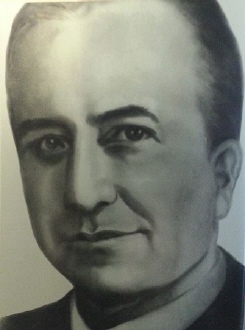
Cecil Charles Duncan was a Canadian ice hockey administrator. He served as president of the Canadian Amateur Hockey Association (CAHA) from 1936 to 1938 and led reforms towards semi-professionalism in ice hockey in Canada. He served as chairman of the CAHA committee which proposed a new definition of amateur to eliminate what it called "shamateurism", in the wake of Canada's struggles in ice hockey at the 1936 Winter Olympics. He negotiated a series of agreements to protect the CAHA's interests, and to develop relationships with all other areas of the world where hockey was played. The agreements allowed the CAHA to become independent of the Amateur Athletic Union of Canada which wanted to keep the old definition of pure amateurism. Duncan's reforms also returned the CAHA to affluence after four years of deficits during the Great Depression and increased player registrations in Canada.
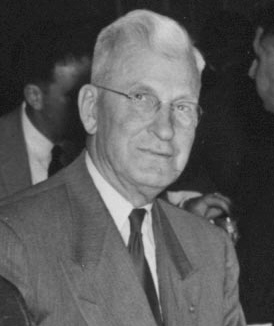
John Welch Hamilton was a Canadian sports executive. He served as president of the Canadian Amateur Hockey Association (CAHA) from 1930 to 1932, president of the Amateur Athletic Union of Canada from 1936 to 1938, and was a member of the Canadian Olympic Committee for 17 years. His leadership of the CAHA and the AAU of C coincided with efforts to maintain amateurism and combat growing professionalism in sport. He appointed a committee to establish better relations between the CAHA and professional leagues, and praised the players and teams for quality hockey and growth of the amateur game in Canada despite the competition. He favoured professionals in one sport playing as amateurs in another, and took charge of the AAU of C at a time when the CAHA, the Canadian Amateur Basketball Association, and the Canadian Amateur Lacrosse Association challenged the definition of amateur, and later broke away from the AAU of C which wanted to hold onto purist ideals of amateurism.

Frank Ernest Sandercock was a Canadian ice hockey administrator. He served as president of both the Canadian Amateur Hockey Association and the Alberta Amateur Hockey Association, and had previously been an executive with the Ontario Hockey Association and founded a hockey organization to operate leagues in Calgary. He was an early proponent of junior ice hockey and senior ice hockey in Alberta, fostered growth in the game, and sought to reinvest profits into minor ice hockey for the younger generation.
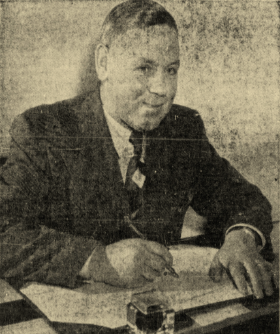
Douglas George Grimston was a Canadian ice hockey administrator who served as president of the Canadian Amateur Hockey Association (CAHA) from 1950 to 1952. He oversaw the establishment of the Major Series for the Alexander Cup and implemented a new deal for player contracts in senior ice hockey, in response to the Allan Cup championship being dominated by a small group of teams who sought to protect themselves from professional leagues recruiting their players. He opposed the National Hockey League wanting its junior ice hockey prospect players on stronger teams, which led to limits on the transfer of players to keep balanced competition for the Memorial Cup. After the 1952 Winter Olympics where the Canada men's national ice hockey team won the gold medal, Grimston recommended withdrawal from Olympic hockey since European nations would never agree to ice hockey rules which allowed physical play. Grimston later accused International Ice Hockey Federation vice-president Bunny Ahearne of financially exploiting of the Edmonton Mercurys on a European tour, which led to a physical altercation between them.
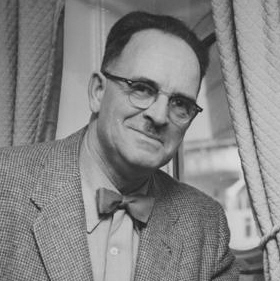
William Bryden George, also known as Baldy George, was a Canadian sports administrator and agriculturalist. He was president of the Canadian Amateur Hockey Association from 1952 to 1955, when Canada debated whether it would withdraw from the Ice Hockey World Championships and the Olympic Games. At issue was the perceived financial exploitation of the Canada men's national ice hockey team and abuse from European media on the Canadian style of physical play. He wanted a financial guarantee for the national team when it travelled since its participation increased attendance at events in Europe. Canada did not participate at the World Championships in 1953 and placed second in 1954, which led to heavy criticism by media in Canada for the failure to win. Although Canada won the 1955 Ice Hockey World Championships, George questioned future participation and was concerned that the game in Europe took on political and religious meanings in which Canada did not want to become involved.
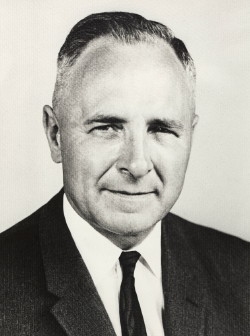
Arthur Thomas Potter was a Canadian ice hockey administrator. He was president of the Canadian Amateur Hockey Association (CAHA) from 1962 to 1964, and oversaw the establishment of a permanent Canada men's national ice hockey team after he decided that sending the reigning Allan Cup champion to international competitions was no longer the answer. He felt that Canada needed discipline to handle Cold War tactics and propaganda at the Ice Hockey World Championships, sought to give its best players to develop as a team, and supported a plan by Father David Bauer to assemble a team of amateur student athletes to complete at the 1964 Winter Olympics.

Frederick Paul Henry Marples was a Canadian sports executive in ice hockey and athletics. He was president of the Winnipeg Monarchs team which won Winnipeg Amateur Hockey League championships in 1914 and 1915, and the Allan Cup as senior ice hockey champions of Canada. His operation of a reserve team to support the Monarchs led to debates on player eligibility for the Allan Cup and calls for a national governing body of hockey. As the secretary-treasurer of the Winnipeg Amateur Hockey League, he helped establish both the Manitoba Amateur Hockey Association (MAHA) and the Canadian Amateur Hockey Association (CAHA) in 1914; then served as secretary-treasurer of the MAHA from 1914 to until 1934, and as secretary of the CAHA from 1926 to 1945. He sought to grow the game in rural regions of Manitoba, promote minor ice hockey as a source of future senior players, to keep players in junior ice hockey until age 21, and was against the exodus of amateur players to professional teams.

John Howard Crocker was a Canadian educator and sports executive. He began teaching physical education at the Young Men's Christian Association (YMCA) in his hometown of St. Stephen, New Brunswick, then graduated from the International YMCA Training School, and introduced basketball to Nova Scotia at Amherst. He won the 1896 and 1897 Canadian pentathlon championships, then graduated from University of New Brunswick. After serving in Halifax, he was the physical education director for the Toronto Central YMCA, where he established the YMCA Athletic League. He introduced lifesaving courses to the curriculum by 1903, and was a charter member of the Ontario branch of the Royal Life Saving Society Canada in 1908. As the general secretary of the Brantford YMCA, he helped design and raise funds for a larger building to meet growing membership. He served the YMCA in China from 1911 to 1917, oversaw construction of a new building in Shanghai, and the city's first major sports stadium. He introduced volleyball to China in 1912, then helped establish the Far Eastern Championship Games in 1913. He later served as secretary of the Chinese Olympic Committee, and led a national physical education program with support of the Chinese government. Based in Winnipeg, he implemented YMCA programs despite World War I austerity measures. As secretary for physical education in Canada from 1921 to 1930, his physical education programs sought to produce a whole man, rather than an athlete. He retired from the YMCA after serving as president of the North American Physical Education Society from 1928 to 1930, remaining a lifetime advisor to the YMCA.



















